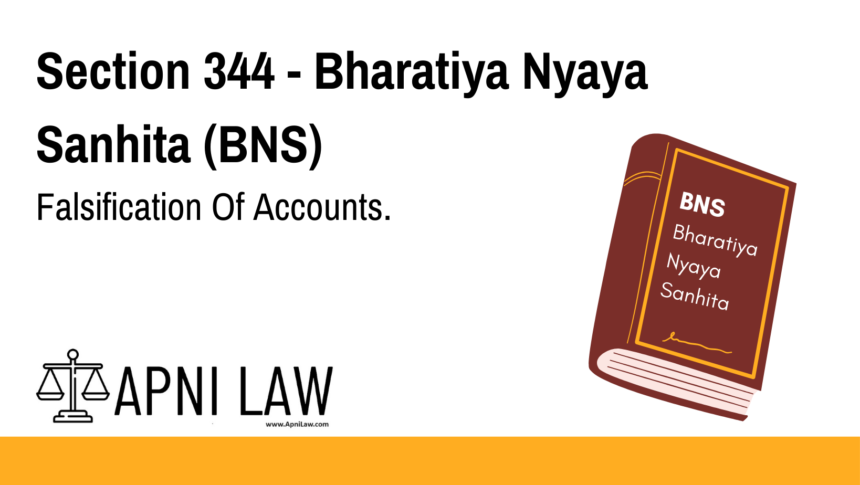Code: Section 344 BNS
Whoever, being a clerk, officer or servant, or employed or acting in the capacity
of a clerk, officer or servant, wilfully, and with intent to defraud, destroys, alters, mutilates or
falsifies any book, electronic record, paper, writing, valuable security or account which
belongs to or is in the possession of his employer, or has been received by him for or on
behalf of his employer, or wilfully, and with intent to defraud, makes or abets the making of
any false entry in, or omits or alters or abets the omission or alteration of any material
particular from or in, any such book, electronic record, paper, writing, valuable security or
account, shall be punished with imprisonment of either description for a term which may
extend to seven years, or with fine, or with both.
Explanation.—It shall be sufficient in any charge under this section to allege a general
intent to defraud without naming any particular person intended to be defrauded or specifying
any particular sum of money intended to be the subject of the fraud, or any particular day on
which the offence was committed.
Explanation of Section 344 BNS
Section 344 of the BNS addresses the falsification of accounts, highlighting the severity of fraudulent actions concerning financial records. This section applies to individuals like clerks, officers, or servants who handle or have access to their employer’s financial documents.
Key Provisions:
- Intent to Defraud: The offense must be committed willfully with the purpose of deceiving.
- Scope of Offense: Includes destroying, altering, mutilating, falsifying records, or making false entries in any book, electronic record, paper, writing, or account related to the employer.
- Punishment: The offender is liable for imprisonment (up to seven years), a fine, or both.
Illustration
Example 1: Altering Financial Records
A clerk at a company alters financial statements to conceal embezzlement. Since this action was intentional and aimed at deceiving the employer, it falls under Section 344 BNS, attracting imprisonment, a fine, or both.
Example 2: Making False Entries
An officer at a bank falsifies transaction records to hide discrepancies. This fraudulent act is covered under Section 344 BNS as it involves intentional falsification with the aim to deceive.
Common Questions and Answers on Section 344 BNS
1. What is considered falsification of accounts under Section 344?
- Answer: It includes actions like destroying, altering, mutilating, falsifying documents, or making false entries in books, electronic records, or accounts belonging to an employer with fraudulent intent.
2. Does Section 344 apply to electronic records?
- Answer: Yes, the section specifically mentions electronic records, covering both digital and physical documents.
3. Is it necessary to name the victim in a charge under Section 344?
- Answer: No, it is sufficient to allege a general intent to defraud without specifying the individual or the exact amount involved.
4. What are the penalties under Section 344?
- Answer: The punishment can be imprisonment for up to seven years, a fine, or both.
Conclusion
Section 344 BNS serves as a legal deterrent against the falsification of financial records, a crime that can have significant repercussions in both corporate and public sectors. The section emphasizes the importance of maintaining integrity in financial dealings, with stringent penalties to prevent and address fraudulent activities.











